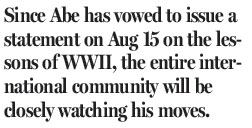World watching Abe's moves on Japan's past
By Pang Zhongpeng (China Daily) Updated: 2015-03-20 07:51
In contrast, by acknowledging the importance of the upcoming ministerial meeting but refusing to reflect upon Japan's past atrocities, the Abe administration is playing with fire. Japanese right-wing forces' attempt to question the exact number of victims in the Nanjing Massacre so as to deny the war crime, for example, reveals their dirty intention of denying that Japan invaded and occupied China and carried out the heinous crimes.
The right-wing forces want more than that. They believe that, without being burdened by the guilt of invasion-related crimes, Japan will not have to befriend its Asian neighbors and thus can blame them for regional tensions that are thwarting East Asian unification.
This trick, however, is never going to work. The only option left for Japan, if it is to make diplomatic breakthroughs in Asia, is to accept its wartime crimes, fulfill all the responsibilities that come with that, and stop denying or beautifying its shameful history.
Abe has vowed to issue a statement on Aug 15 on the lessons of WWII, and the entire international community will be closely watching. Should he admit Japan's crimes when occupied neighboring countries, such as what former Japanese prime minister Tomiichi Murayama did in 1995, Abe could regain the trust of other countries. But if he merely focuses on Japan's contribution to the world or dares to play a verbal game with regard to his country's sordid wartime history, Japan will slide further into a diplomatic crisis.
The author is a researcher at the Japan Studies Center of the Chinese Academy of Social Sciences.

I’ve lived in China for quite a considerable time including my graduate school years, travelled and worked in a few cities and still choose my destination taking into consideration the density of smog or PM2.5 particulate matter in the region.











